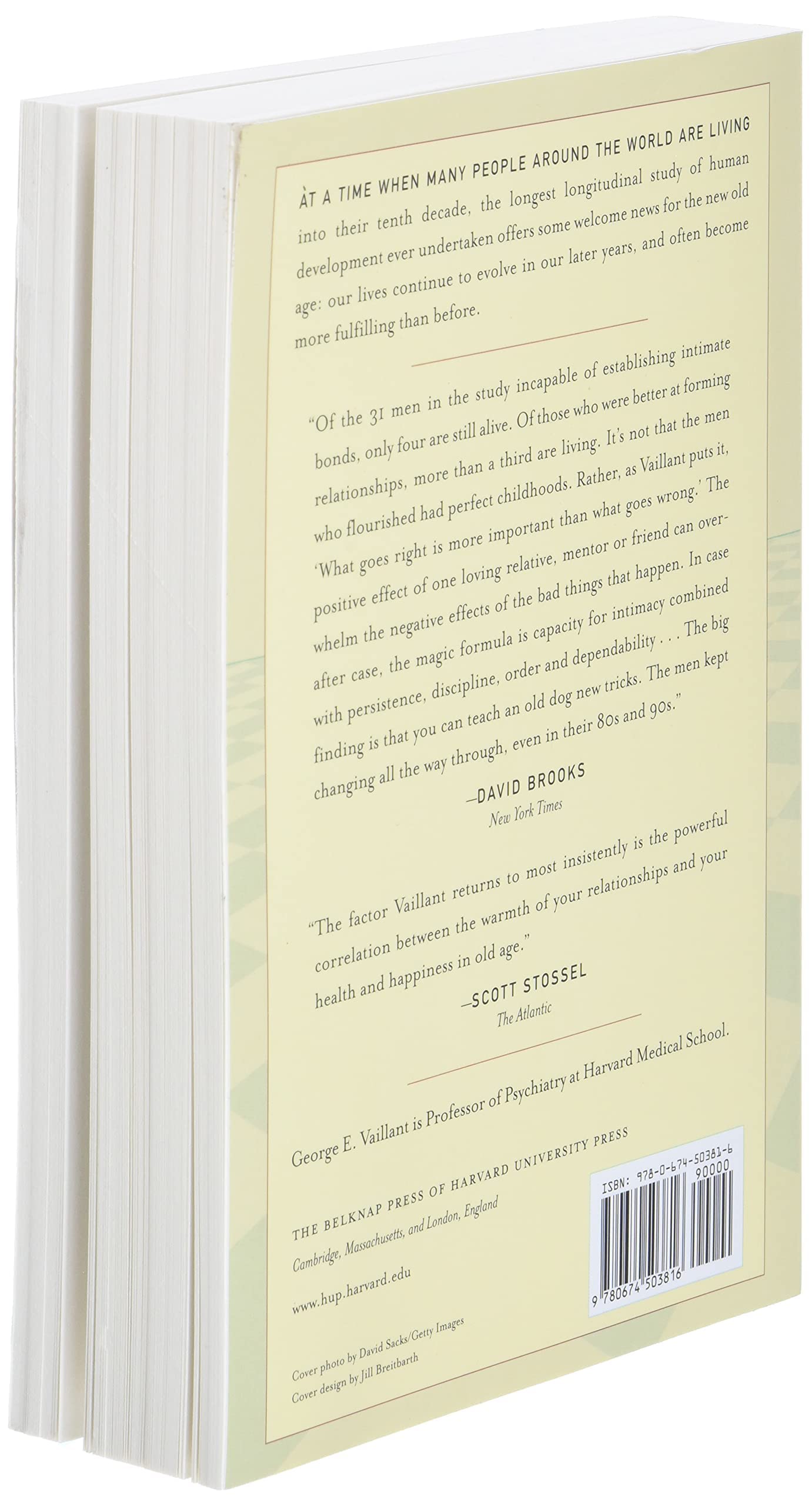معلومات عنا
دعم العملاء
احصل على التطبيق

قم بتوجيه الكاميرا لتنزيل التطبيق
حقوق الطبع والنشر © 2024 Desertcart Holdings Limited






Triumphs of Experience: The Men of the Harvard Grant Study
S**O
Quick and reliable
Perfectly delivered, in good shape
M**T
Something everyone should read
You can't find data like this...the results of this study should be part of our own data sets as we set forth in life.It really does illustrate that a) people can and do change; b) not necessarily in the ways we expected; and c) maybe our theories and models don't explain all behaviour.
F**S
Fascinating and touching 75 year longitudinal study of Harvard undergraduate men
Magnificently written, with beautiful, very touching stories, and fascinating scientific data. There are extraordinary revelations of what most contributes to high achievement in life, and to greater satisfaction in later life - often vindicating what people in psychoanalytic circles have been asserting for decades. Vaillant writes with great sensitivity and self-reflection about his own biases and self-discoveries. The Grant study is fascinating for what it reflects about the changing nature of leadership theory in the C20th (it began in 1938 as a study of how body shape might predict future accomplishment!), and for the ways in which the scientists sought to measure and test new theories, and establish their 'decathlon framework' for success in life. It includes great sections on the Erikson's maturation stages, and unconscious defences as modes of resilience. I can't recommend it highly enough!
T**N
A very useful read on how to live a happy life
I chose this book in the first place because it was based on research and not someone's suggestion based on their own personal views or experiences. I think this book helps in objectively determining factors that influence happiness in our lives.
R**N
The Power of Longitudinal Research
Some of the oldest and most contentious debates on human beings centre around the relative influence of heredity (genetics), environment and individual voluntary action on growth and development. These include whether mental illness has genetic origins, what factors determine "success" in life, and whether adults continue to "develop" as they grow older (or whether all development happens before a certain age). These questions cross disciplinary boundaries as they involve concepts from psychology, psychiatry, sociology, and genetics.Great thinkers like Freud and Erikson made significant contributions to these debates, but many of their contributions were based on intuitive theorizing rather than rigorous empirical evidence. With time and careful research, some of their theories have been upheld, and others disproved! The studies that have made the most impact are longitudinal studies in which a carefully chosen cohort of respondents was tracked periodically over an extended period of time.The Harvard Grant StudyOne of the most well known of these studies is the Havard Grant study which commenced in the late 1930s and early 1940s and continues till this day. The survivors of the cohort (who were Harvard sophomores when they were recruited) have now entered their 90s, and the data collected therefore allows several inferences to be drawn on adult development.George F. Vaillant was the director of the Harvard Grant Study for over two decades. His latest book, The Triumphs of Experience, presents the latest findings. I found it a fascinating read as it not only uncovers new insights, but also questions some of the conclusions reached at earlier stages of the study. The Harvard Grant Study draws its conclusions from rigorous multivariate analysis, but Vaillant presents the findings with a distinctive and rare combination of statistical rigour and empathy for his subjects - in addition to tables containing the statistical results, there are profiles (disguised, of course) of different respondents of the study, and these give the reader a sense of being part of the study team.The original design and subsequent evolution of the study show how much our models of adult development have changed over time. At the time the study started, physical constitution and mental health indicators were expected to be important predictors of subsequent progress of the study. Parental/family relationships and childhood upbringing were thought to be unimportant. Yet, the latest Harvard Grant Study findings show that loving relationships during childhood are important for longevity and success in life.Findings of the Harvard Grant StudySome of the important findings of this study reported in The Triumphs of Experience:Individuals develop through their adult lives as well, not only upto the stage of adolescence.The impact of childhood trauma decreases over time; more importantly, the positive experiences of a loving childhood have enduring impact.Being well integrated and self-driving while young helps people live longer.Divorce led to happier marriages than the bottom third of sustaining marriages.Alcoholism had bigger negative impacts than measured by most previous studies. It accounted for more than half of the divorces in the Grant Study. The study shows that it is unlikely that alcoholics can return safely to social drinking, thereby upholding the methodologies followed by organizations like Alcoholics Anonymous.The involuntary coping styles predicted by Freud exist, and they are important for human effectiveness.Important Lessons for Management of Long-term Research ProgramsThe Harvard Grant Study is interesting from a research management perspective as well. Over its 70+ year lifespan so far, the study has transcended several research directors and team members, but the integrity of the study has not been compromised. George Vaillant estimates that about $ 20 million has been spent on the study over time, with an average cost of $10,000 per research paper published. The study has had different sponsors at different times, and while the study had to adapt itself to the priorities of these sponsors (such as a major retailer, cigarette company and a program against alcoholism), it still managed to sustain the collection of data related to its core research questions.With its emphasis on the choice of appropriate control variables and other related issues of study design, this book is a great primer on how to design and adapt longitudinal research studies for maximum research impact.Rishikesha Krishnan, IIM Bangalore
ترست بايلوت
منذ شهرين
منذ أسبوعين